ILLUSTRATION CONTEST 2024
Column
A Conversation with the Winners of the Pokémon Card Game Illustration Grand Prix
We invited the winners of the past two editions of the Pokémon Card Game Illustration Grand Prix to talk about the fun and challenges of illustrating Pokémon, their future goals, and more.
Note: The following conversation happened via an online call.
The photo of Yuu Nishida is a partial reprint of a photo featured in a past article.
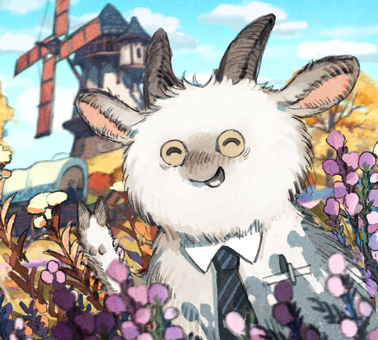
Jiro Sasumo
Jiro Sasumo is an office-worker and part-time illustrator who won the second Pokémon Card Game Illustration Grand Prix. The creative goal for Sasumo is to draw illustrations that can make the viewer feel the atmosphere and story of a particular scene as if they were there. Sasumo’s favorite Pokémon generation is Pokémon Gold and Pokémon Silver, and favorite Pokémon is Charizard.
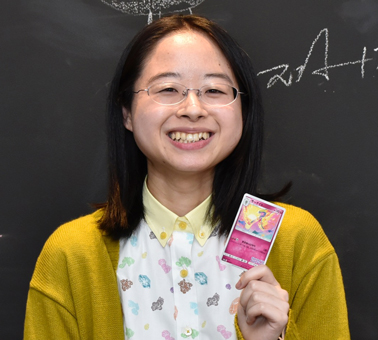
Yuu Nishida
Yuu Nishida is an illustrator from Akita prefecture and a part-time high school teacher who won the first Pokémon Card Game Illustration Grand Prix. Since 2019, she has been a Pokémon TCG official illustrator. Her creative goal is to draw illustrations that fill the viewer with warmth. Nishida’s favorite Pokémon generation is Pokémon Black and Pokémon White, and her favorite Pokémon is Yamask.
Learning Illustration Techniques and Choosing the Materials
Q: First of all, please tell us about your careers as illustrators.
Sasumo: I started drawing and publishing my art on the internet when I was still quite young. I continued doing so even after starting a career. And, after winning the second Pokémon Card Game Illustration Grand Prix, I became a part-time professional illustrator.
Nishida: I have been drawing since I was a child. I started working as a freelance illustrator in 2017, and I’ve been part of a group of illustrators from my region in Northeast Japan called the “Tohoku Illustrators Club.” Currently, I am a part-time teacher and advisor to the art department at the high school I attended in my youth.
Q: How did you learn your illustration techniques?
Nishida: I didn’t actually have the opportunity to formally study art at school. As a junior high school student, however, I did take a correspondence drawing course. I have been drawing every single day since. I think that daily practice over the long term is the most important aspect of refining one’s technique.
Sasumo: I attended art school, and there, I learned about drawing and basic composition. This experience provided the groundwork for my art, but since I majored in the fine arts, the things that I learned there weren’t immediately applicable to illustration. What I think had the most direct impact in that regard is how I have been constantly drawing illustrations since I was a student and how I exposed myself to a variety of different works of art.
Q: What materials and equipment do you use to create your illustrations, and what makes you choose them?
Sasumo: I’ve been using Photoshop with a pen tablet for many years now.
Nishida: When I do it for work, I mostly draw digitally. I used to use a pen tablet, too, but I eventually made the switch to a touchscreen tablet. I like to draw as if I were doing it on paper, so being able to draw directly on the screen feels more natural to me. It’s how I still do it to this day.
Q: And what software do you use?
Nishida: I use CSP (Clip Studio Paint). I’ve been using it for three or four years now. CSP has many brushes that recreate the feeling of a real brush, making it very easy to use. You can download all kinds of different brushes; the ones I like and use the most have a somewhat rough texture to them.
Memories of Pokémon
Q: How familiar were you with the Pokémon franchise to begin with?
Sasumo: My generation has a very strong bond with Pokémon. Many of my happiest childhood memories are associated with Pokémon—I played the video games, watched the anime on TV every week, and every year, when a new Pokémon movie came out, I would watch it in a movie theater with my dad.
I also used to collect TCG cards and play against my little brother with them. We were too young to understand the actual rules, so we played according to a simpler set of rules that we had come up with on our own. Even as an adult, I’ve kept following the franchise. I often see illustrators I like announcing on social media that they had provided artwork for a new Pokémon TCG release, and every time I would be surprised by how many talented artists were working on it. Showing Pokémon as imagined by such an incredible variety of different illustrators is a truly special feature of the TCG.
Nishida: Pokémon has been all around me since my childhood. I received Pokémon FireRed for the Game Boy Advance when I was in elementary school, and that was the first video game I ever played. I also love the Pokémon anime, which I started watching with the Pokémon: Jirachi—Wish Maker movie. I started collecting the Pokémon TCG cards while in elementary school, mainly going after cards with particularly cute or cool illustrations. One time, I even received a TCG gift box for Christmas.
The Stories Behind the Contest-Winning Illustrations
Q: Now, let’s talk about your winning illustrations for the Pokémon Card Game Illustration Grand Prix. Tell us about the reasoning behind your choice of Pokémon or a particular story about the process of drawing it.
Sasumo: I mainly chose to draw Charizard because I simply love them. The theme of the 2nd Pokémon Card Game Illustration Grand Prix was “Pokémon Being Cool.” I was worried that using Charizard to convey coolness would be unoriginal, but what can I say? They really are cool! (Laughs.) So I stuck with my initial choice and took on the challenge.
When I started drawing, I realized that fitting Charizard into this theme was very difficult. The problem was that the subject was too cool to begin with. I ended up telling myself that maybe there were a lot of other artists who could pull it off much better. If that were the case, what was the point of me drawing Charizard? Finding meaning in what I was drawing was very difficult.
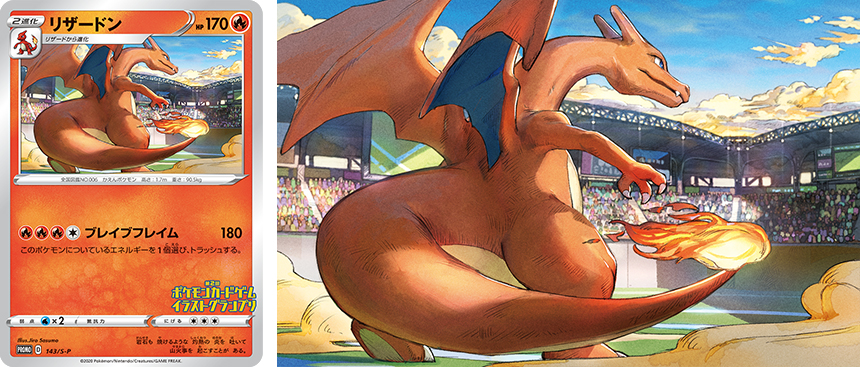
“Charizard“ Illustrator: Jiro Sasumo
Promo card from the second Pokémon Card Game Illustration Grand Prix (only released in Japan)
Q: How did you manage to do it?
Sasumo: I tried too hard to make my first rough sketches look like existing trading card game illustrations. Then I realized that wasn’t my style and went back to what made me think of Charizard as cool during my childhood. I changed my focus to drawing what I liked. As a kid, Charizard’s size and its sturdy look left a big impression on me. To recreate this awe, I composed the illustration from a perspective close to the ground and put emphasis on the tail. I wanted it to feel as if we’re rooting for Charizard as it heads into battle.
Q: And how about you, Nishida?
Nishida: I chose Gardevoir. The first Pokémon Card Game Illustration Grand Prix allowed each participant to submit up to three drawings. There were several Pokémon that I wanted to draw, including Pikachu, Eevee, Darkrai, and Gardevoir. I drew a lot of rough sketches with these subjects, but as the deadline approached, I narrowed it down to just one.
To me, Gardevoir has a very gentle look. To express that gentleness, I chose color combinations that made me feel warm and fuzzy inside.
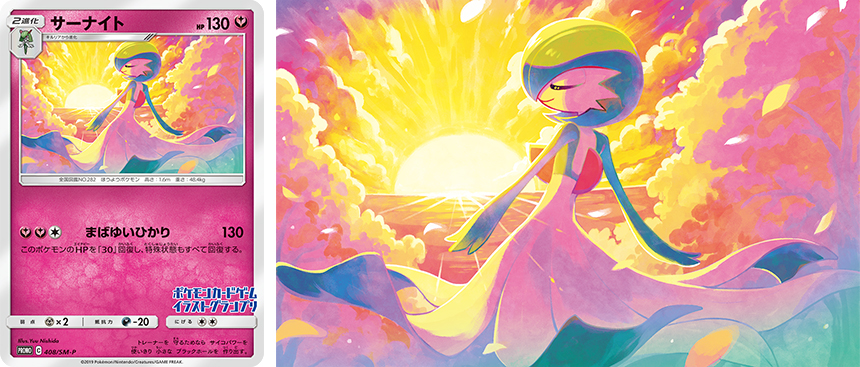
“Gardevoir“ Illustrator: Yuu Nishida
Promo card from the first Pokémon Card Game Illustration Grand Prix (only released in Japan)
Q: Please tell us what you think of each other’s winning illustrations.
Sasumo: The first thing I notice when looking at Nishida’s Gardevoir is how beautiful the colors are. Nishida’s personality shines right through the artwork, making it that much more charming. I love how you can almost feel the light’s warmth.
Nishida: Thank you. What strikes me in Sasumo’s illustration is how cool and imposing Charizard looks. I also love how you can see the air moving in the arena through the clouds of dust at Charizard’s feet and the flame on its tail. This illustration makes me excited for the battle that is about to begin.
Q: Your contest-winning illustrations were made into promo cards. Tell us about how you felt when you first held those cards in your own hands.
Nishida: In order to get the card, my family and I went all the way to Sendai, the only city in the Tohoku region to have a Pokémon Center. Once I was there and saw a sign saying that they were handing out promo cards, I was so excited I can’t even describe it (laughs). The store clerk gave me the card and explained that the illustration on it had won the Pokémon Card Game Illustration Grand Prix. I was too shy to say that I was the one who drew it, so I just thanked the clerk and accepted the card. The clerk’s enthusiasm really resonated with me. I got emotional when I saw my name on the bottom left of the card. I always loved trading card games; drawing for one had always been one of my goals, so I couldn’t be happier.
Q: Seeing your name on a card must be really fulfilling.
Nishida: I always check the illustrator’s name when I get a new card. Knowing that this time, the card had mine on it was very moving.
Sasumo: I also went to a Pokémon Center to get my card (laughs). And receiving my own Charizard card deeply moved me as well. Since the Pokémon TCG is so popular, my friends were very happy for me too.
Drawing for the Pokémon TCG: Sword & Shield—Brilliant Stars expansion
Q: Now, let’s talk about the cards you illustrated for the Pokémon TCG: Sword & Shield—Brilliant Stars expansion, which features Pokémon together with their Trainers. Nishida, tell us about Single Strike Urshifu V.
Nishida: I was tasked with illustrating a CSR (“Character Super Rare”) card, and it was a great honor for me. I drew Urshifu and Gloria training together. I wanted it to look as if Urshifu were showing her a fighting technique, so I had to make sure that it didn’t look as intense as a real fight. It’s like the two of them are trying to act in sync.
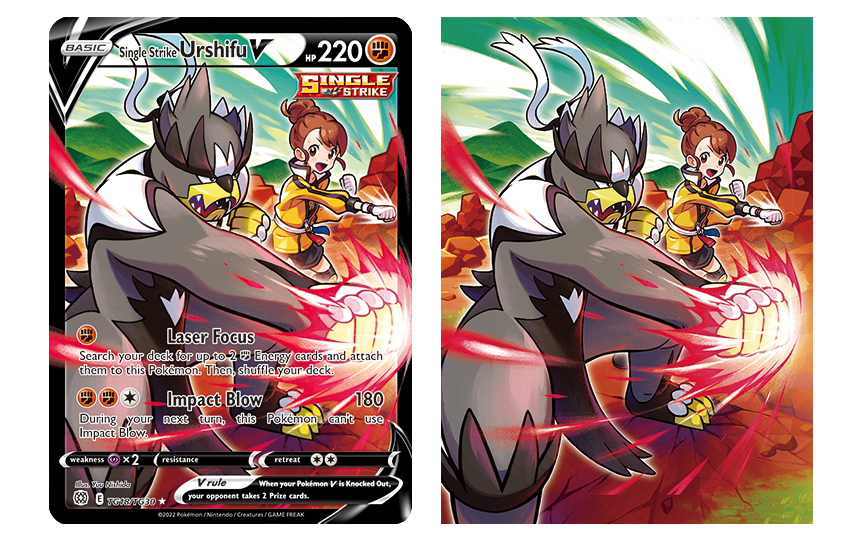
“Single Strike Urshifu V“ Illustrator: Yuu Nishida
Included in the Trainer Gallery subset of Pokémon TCG: Sword & Shield—Brilliant Stars
Q: Sasumo, please tell us about the CHR (“Character Rare”) “Vaporeon” card.
Sasumo: Creatures gave me the theme of Vaporeon and Blue traveling together near the water, so I tried to capture a specific moment of their adventure. Since water was one of the main themes, I focused on making it look as beautiful as possible. As for the composition, my goal with it was to show a lively, energetic Vaporeon.
I wanted the connection between Blue and Vaporeon, as well as the connection between them and the background, to look as natural as possible. After some trial and error, this is what I came up with.
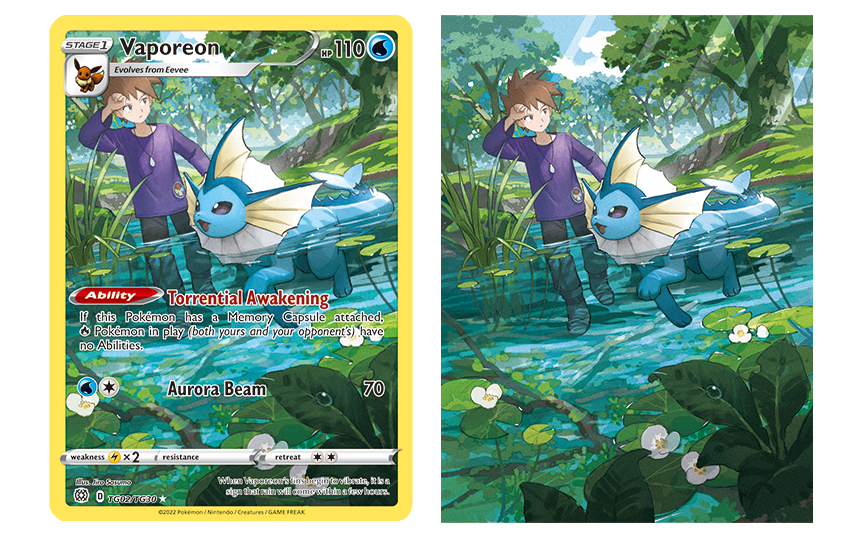
“Vaporeon“ Illustrator: Jiro Sasumo
Included in the Trainer Gallery subset of Pokémon TCG: Sword & Shield—Brilliant Stars
Q: How do each other’s illustrations make you feel?
Nishida: The water looks stunning, and there is an incredible variety of water plants. Vaporeon looks so happy as it swims that it’s just wonderful.
Sasumo: Nishida’s Single Strike Urshifu V illustration makes the scene appear cool and cute at the same time, and I find that extremely charming. It’s endearing to see Urshifu and Gloria striking the same pose, and I particularly like how you can see Urshifu being such a good teacher to her.
Q: Starting with the VMAX Climax set (released in the US as part of the Sword & Shield—Brilliant Stars expansion), some of your illustrations will be adopted in Pokémon TCG products, meaning that more players will be able to see them than with promo cards. What kind of expectation do you have for this, Sasumo?
Sasumo: As a long-term goal, I would love for a lot of people to remember my name and to want to collect cards illustrated by me. Of course, to achieve that, I need to make illustrations that impress users.
Q: And you, Nishida, illustrated a card package for the first time in VMAX Climax.
Nishida: I was so surprised when I read the email asking me to do it. I really didn’t expect to receive an opportunity like that.
Q: So, you were happy but also felt the pressure about it.
Nishida: I was excited that my illustration would go on the package, but at the same time, I felt the pressure of having to draw something good enough for it.
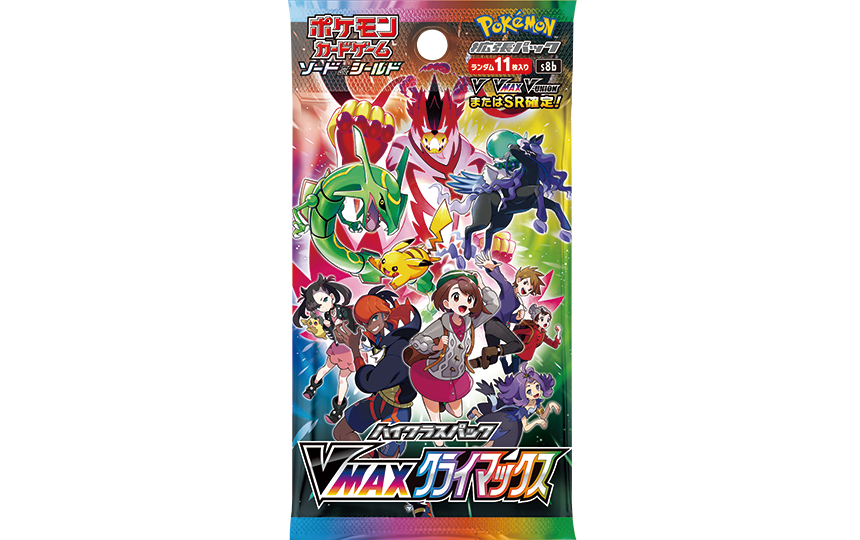
Q: Is drawing an illustration for the package different from drawing one for a card?
Nishida: When creating a package illustration, you have to keep in mind that the logo and title will go on it, and you have to incorporate that into the composition while also depicting the subject Pokémon or characters according to their characteristics. That is what makes it different from illustrating cards, and it was quite hard for me since it was my first time.
Q: How did you overcome the pressure and nervousness of this responsibility?
Nishida: In the end, I remained nervous all the way through (laughs). While I was working on that illustration, I replayed The Isle of Armor and The Crown Tundra from the Pokémon Sword Expansion Pass and Pokémon Shield Expansion Pass, paying a lot of attention to how the characters were introduced in scenes. This helped me learn more about these characters and have more fun while drawing.
Thoughts on Contributing to Pikachu V-UNION
Q: Both of you contributed to the illustration of the Pikachu V-UNION cards. Tell us about it.
Sasumo: Pikachu V-UNION was the first time one of my illustrations was used for a non-promo card. I recently became an official illustrator and because of this, I worried about whether it was OK for me to participate to begin with.
I’ve drawn Pikachu more times than I can count, so I was thrilled that I could do it professionally this time. During the process, I realized that up until that point I had always drawn Pikachu from the image of it I had in my memory. I thought that I didn’t need a reference, but the materials that I had been given covered a lot of details that I had never noticed before. I understand what Pikachu is supposed to look like much better now.
Nishida: I was very happy to be able to contribute to the Pikachu V-UNION illustrations, and drawing for it was a lot of fun. I gave it my all to draw the best Pikachu I could, hoping to get the chance to do it again in the future.
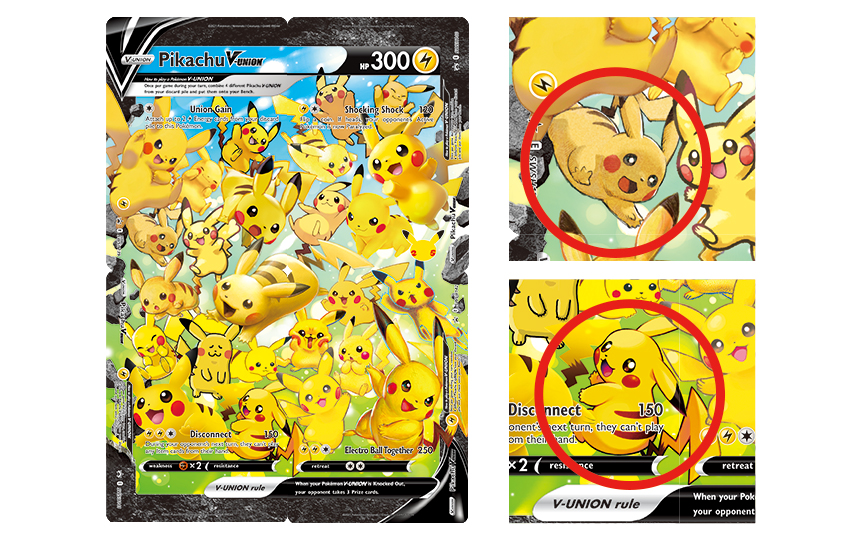
“Pikachu V-UNION“
Included in the Pokémon TCG: Celebrations Special Collection—Pikachu V-UNION
Your Goal in Drawing Pokémon TCG Illustrations
Q: What goals do you keep in mind when drawing an illustration for the Pokémon TCG?
Sasumo: My goal is to draw illustrations that look like portrayals of a world where Pokémon really exist. I believe that Pokémon fans enjoy imagining how Pokémon would go about their lives if they existed in our world, and I’d be happy if my illustrations could help them imagine this scenario.
Nishida: I like playing the TCG, so my goal, or rather my dream, is to illustrate enough cards to be able to build a whole deck.
I often carefully examine cards made by other Pokémon TCG official illustrators, and I sometimes make it a goal to reach their level. For example, I was fascinated and influenced by how well Naoki Saito can show the cool and cute side of a variety of subjects, including both Pokémon and Trainers. Another artist whose works I deeply enjoy is Mitsuhiro Arita. His detailed illustrations make you believe you are looking at a living creature.
In Conclusion: Tips on Drawing Pokémon
Q: As a last question, do you have a message or piece of advice for the contest participants or for those who became interested in drawing Pokémon by reading this article?
Sasumo: Nowadays, the world is full of good art. There are a lot of amateurs who can draw just as well as professionals. This can make someone question whether making art is even worth the attempt, but I would like aspiring artists to keep drawing without getting discouraged. I have also dealt with this type of self-doubt, but I kept drawing anyway. If I hadn’t taken the chance, I would never have gotten such an incredible opportunity as drawing illustrations for the Pokémon TCG. If you want to draw, rise to the challenge and do it.
My tip for drawing Pokémon is to study your subject very carefully. This step is absolutely crucial. Pokémon are so familiar to us fans that we tend to draw them straight from memory. However, if you want to portray them even better, observe how they appear in the games and anime, focusing on their anatomy and proportions.
Nishida: I agree that understanding your subject Pokémon is very important. There are a lot of materials that you can use as reference, such as the games, the anime, the toys, and the TCG cards. I suggest that you analyze these materials and draw that Pokémon from a place of affection.
Personally, I like looking at Pokédex entries in the games. This leads to some interesting discoveries. For instance, a Pokémon being larger or heavier than I expected. Doing this research will also help you come up with a lot of ideas about your subject, its habitat, the way it moves, and so much more. Most of all, you should have fun while you draw and learn to love Pokémon even more.
Composition and text: Shusuke Motomiya (One-up) Photos: Kayoko Yamamoto